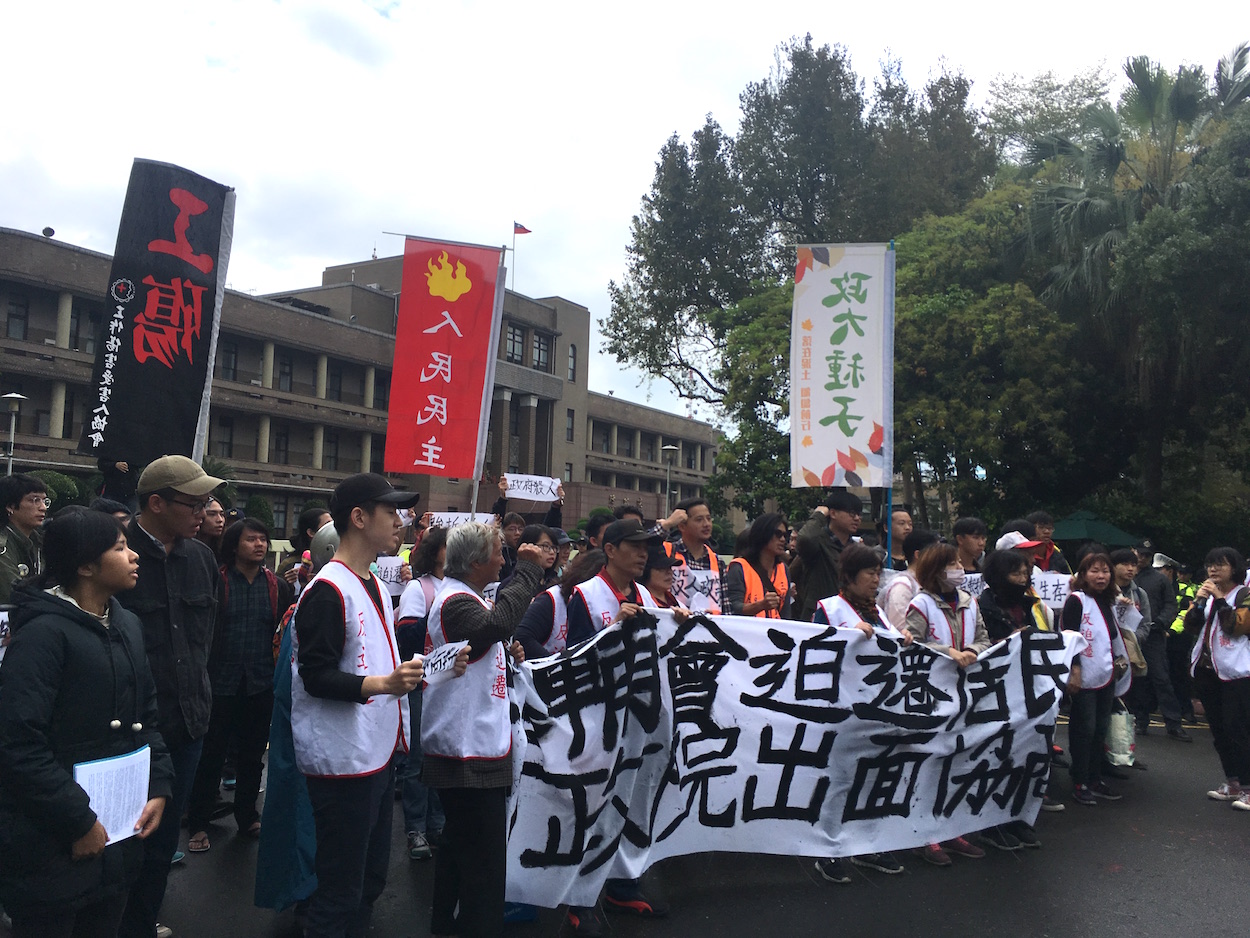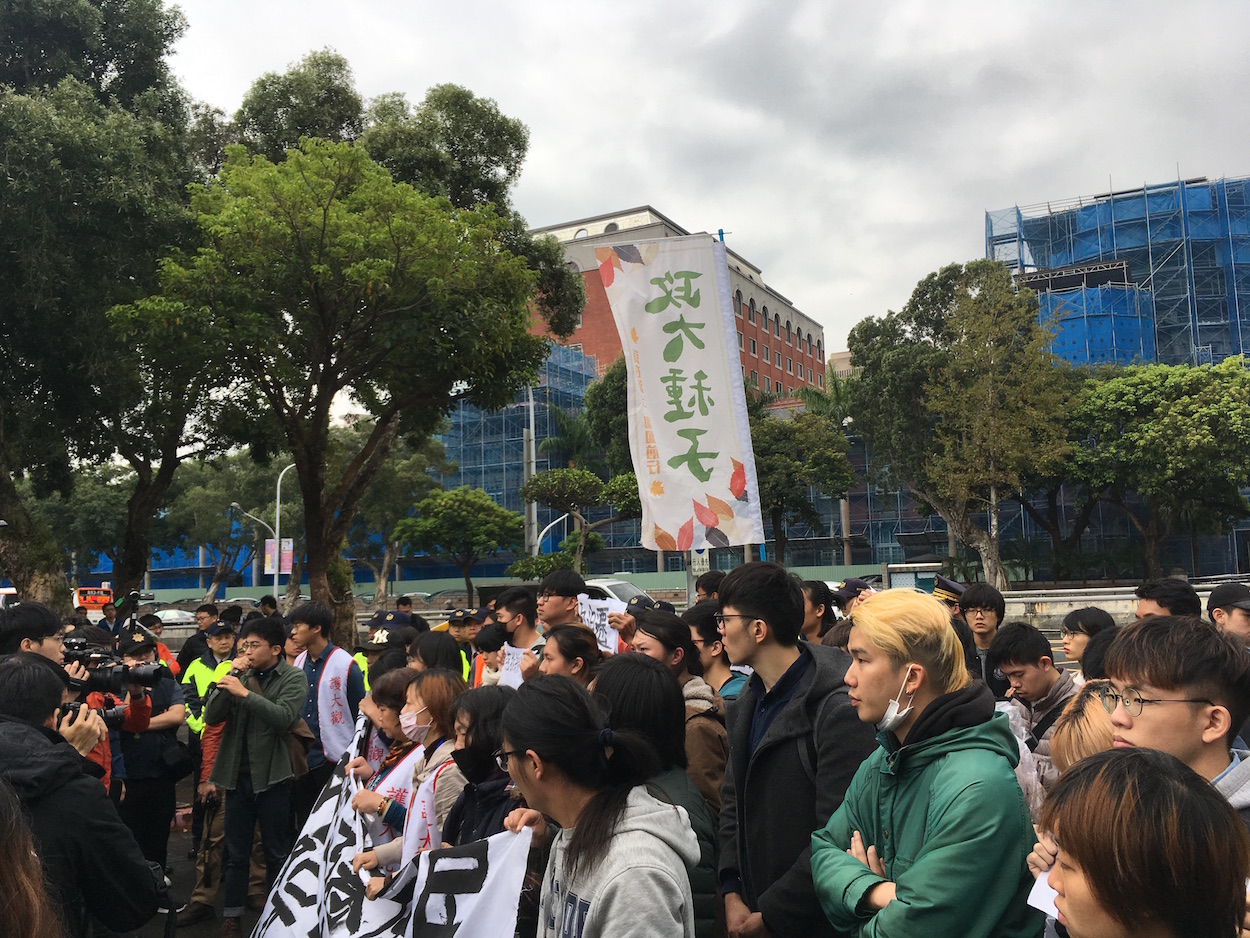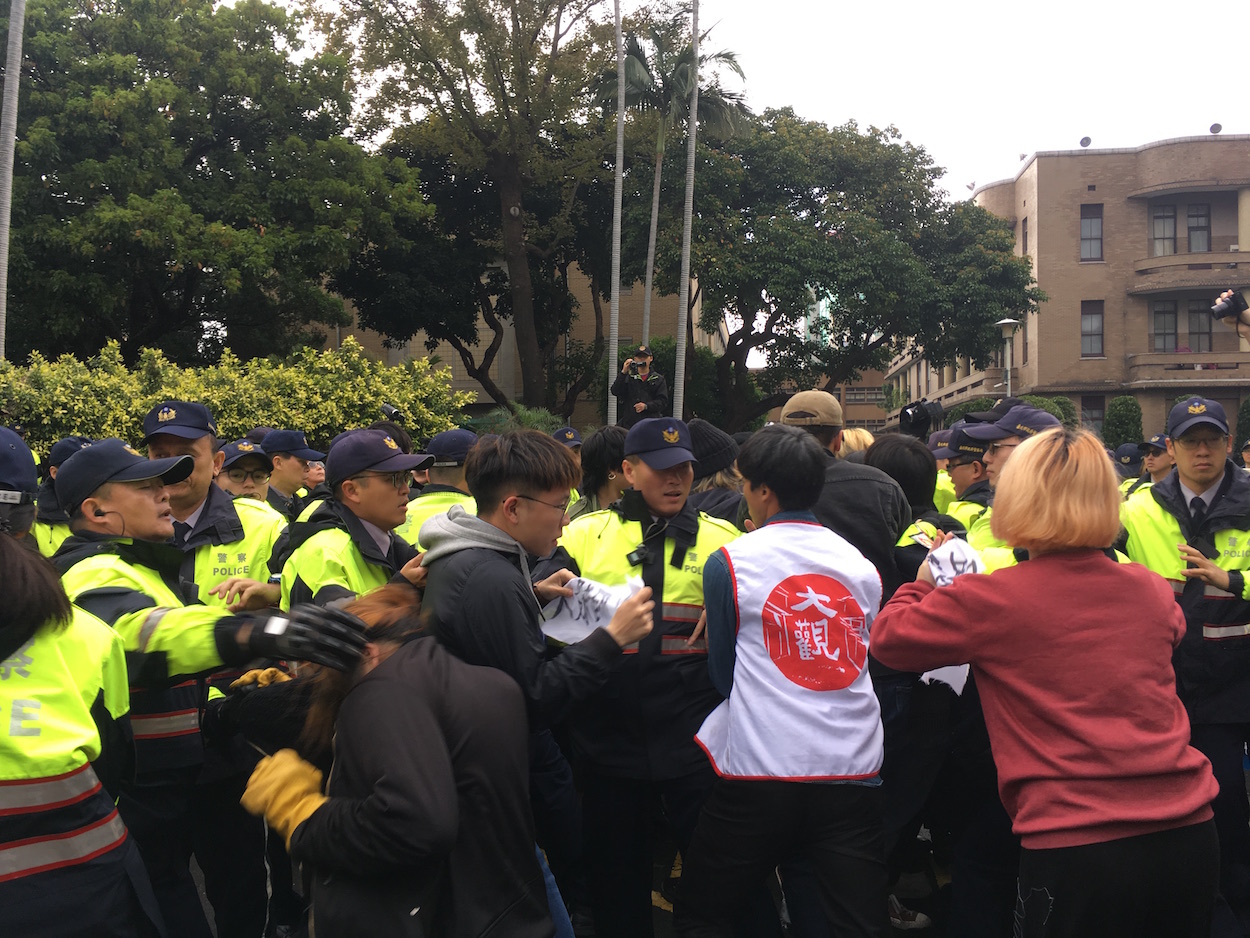by Brian Hioe
語言:
English /// 中文
Photo Credit: Brian Hioe
CLASHES BROKE out between residents of the Daguan Community and police in front of the Executive Yuan this morning. Daguan Community is a military dependents’ village in New Taipei City, whose residents have been facing the threat of eviction for several years. However, most recently, Daguan residents received a notice on March 4th that their homes will be forcibly dismantled on March 18th, hence the demonstration in front of the Executive Yuan this morning.
 Photo credit: Brian Hioe
Photo credit: Brian Hioe
Student activists who have been working with Daguan residents and the residents themselves originally called for a press conference in front of the Executive Yuan at 10 AM this morning. In speeches, students and Daguan residents criticized the Tsai administration for promising a peaceful settlement that would address residents’ needs.
In particular, many residents of Daguan are elderly, impoverished, and would have no place to go if they are evicted from their homes. Some have been living in Daguan for over forty or fifty years. As such, the threat of eviction is viewed by some as something of a death sentence, as even for those with places to go, residents would be unable to accommodate the dramatic shift in lifestyle if resettled.
 Photo credit: Brian Hioe
Photo credit: Brian Hioe
Indeed, a number of residents have occupational injuries or suffer from long-term diseases. Some dismiss protests by residents of military dependents’ villages as frivolous, seeing as military dependents’ villages are usually run-down and residents are given comparatively higher-quality and more expensive housing in return. But among the residents of Daguan Community are individuals old enough and infirm enough that they are actually unable to use elevators and would be unable to use them in a high-rise housing complex in order to get to their homes if, like other evicted military dependents’ villages, that is where they are placed.
Residents of Daguan are former military veterans or individuals who purchased and moved into homes owned by military veterans. As such, in speeches, residents drew connections between their plight and those of military dependents’ villages, such as Huaguang Community, Shaoxing Community, or others, which have also faced eviction threats in recent years. But while media attention to other military dependents’ villages led the Tsai administration to promise that unlike the KMT, it would provide for the socially precarious, Daguan residents have been critical to the lack of similar promises for them. The government claims that residents of Daguan community do not have the property rights to their homes, which were originally owned by the military, and that they are illegal occupants, though Daguan residents insist otherwise that they have purchased the rights to their homes.
 Clashes between Daguan residents and police. Photo credit: Brian Hioe
Clashes between Daguan residents and police. Photo credit: Brian Hioe
Past demonstrations by Daguan residents and supportive student organizers have included forms of direct action, such as a protest in front of DPP headquarters in May 2018 and a camp-out in front of DPP headquarters in November 2018 which ended with several dozen student demonstrators being dragged away and arrested. During this process, demonstrators alleged they were denied basic rights to water, to use the restroom, and other rights normally allowed to those arrested in Taiwan. Other demonstrations have included holding artistic and musical performances at Daguan Community itself, as has also taken place in other military dependents’ villages facing eviction.
During the course of nine-in-one elections last November, Daguan residents called on candidates for New Taipei City including current premier Su Tseng-chang and current New Taipei mayor Hou You-yi to address their situation. As during a confrontation with Su, Su claimed that Daguan was the responsibility of the central government, not the New Taipei local government, this is why Daguan residents would demonstrate outside of the Executive Yuan today, the Executive Yuan being an institution of the central government.
 Injured demonstrator. Photo credit: Brian Hioe
Injured demonstrator. Photo credit: Brian Hioe
The Executive Yuan originally did not send any official to accept a petition of demands from the Daguan Community residents and after the official who sent out to receive the petition proved evasive, unwilling to make any concrete promises regarding their situation, and was unwilling to contact any superiors with the authority to make such decisions he could not do on his own. This led to clashes with the police, which resulted in several demonstrators being arrested and dragged into the Executive Yuan.
At present, Daguan residents and supportive student demonstrators have settled outside the Executive Yuan, stating that for the time being, they will refrain from direct confrontation with the police. However, Daguan residents also stated that seeing as their homes will soon be demolished and they will have nowhere else to go, they would not be moving until they have a response from the Executive Yuan. Yet demonstrators eventually called an end to their demonstration for the day around 1 PM, in the absence of any responses from the government.
 Demonstrators sitting in by the front gate of the Executive Yuan. Photo credit: Brian Hioe
Demonstrators sitting in by the front gate of the Executive Yuan. Photo credit: Brian Hioe
While forced evictions were a major issue demonstrated against by Taiwanese youth activists in the years before the Sunflower Movement, the Tsai administration maintained a moratorium on forced evictions until relatively recently. Daguan residents have cited that the eviction of their community could possibly be a predecessor of a wave of similar evictions as took place under the Ma administration before the Tsai administration took office.
More demonstrations can be expected from members of Daguan Community in the coming days before the eviction is scheduled to happen. But given lacking media presence at the demonstration today, it is yet to be seen whether other youth activists and members of civil society will gather to support the residents of Daguan community.

